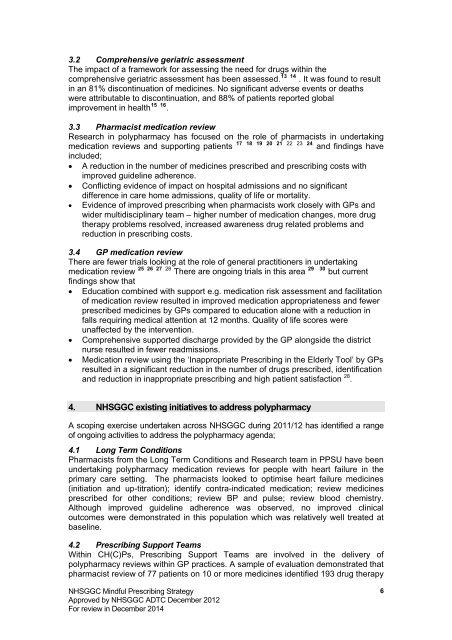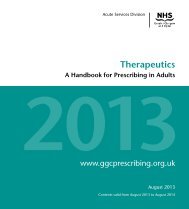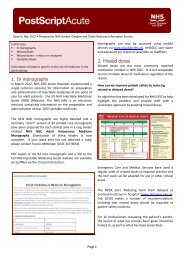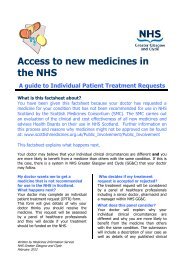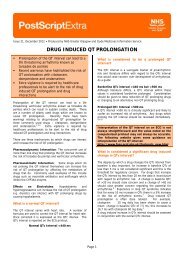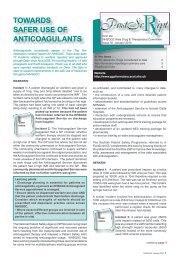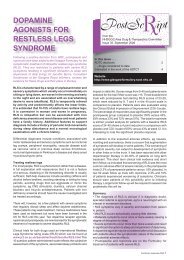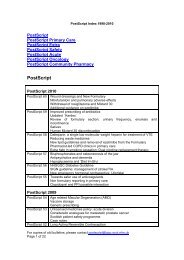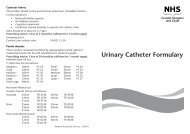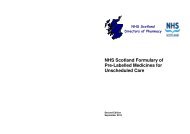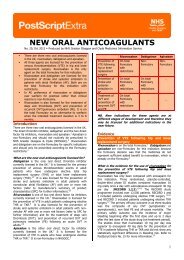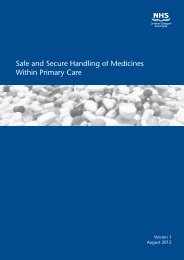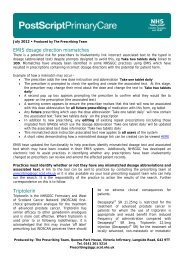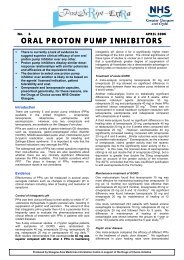NHS GG&C Polypharmacy Strategy - GGC Prescribing
NHS GG&C Polypharmacy Strategy - GGC Prescribing
NHS GG&C Polypharmacy Strategy - GGC Prescribing
Create successful ePaper yourself
Turn your PDF publications into a flip-book with our unique Google optimized e-Paper software.
3.2 Comprehensive geriatric assessmentThe impact of a framework for assessing the need for drugs within thecomprehensive geriatric assessment has been assessed. 13 14 . It was found to resultin an 81% discontinuation of medicines. No significant adverse events or deathswere attributable to discontinuation, and 88% of patients reported globalimprovement in health 15 16 .3.3 Pharmacist medication reviewResearch in polypharmacy has focused on the role of pharmacists in undertakingmedication reviews and supporting patients 17 18 19 20 21 22 23 24 and findings haveincluded; A reduction in the number of medicines prescribed and prescribing costs withimproved guideline adherence. Conflicting evidence of impact on hospital admissions and no significantdifference in care home admissions, quality of life or mortality. Evidence of improved prescribing when pharmacists work closely with GPs andwider multidisciplinary team – higher number of medication changes, more drugtherapy problems resolved, increased awareness drug related problems andreduction in prescribing costs.3.4 GP medication reviewThere are fewer trials looking at the role of general practitioners in undertakingmedication review 25 26 27 28 There are ongoing trials in this area 29 30 but currentfindings show that Education combined with support e.g. medication risk assessment and facilitationof medication review resulted in improved medication appropriateness and fewerprescribed medicines by GPs compared to education alone with a reduction infalls requiring medical attention at 12 months. Quality of life scores wereunaffected by the intervention. Comprehensive supported discharge provided by the GP alongside the districtnurse resulted in fewer readmissions. Medication review using the ‘Inappropriate <strong>Prescribing</strong> in the Elderly Tool’ by GPsresulted in a significant reduction in the number of drugs prescribed, identificationand reduction in inappropriate prescribing and high patient satisfaction 28 .4. <strong>NHS</strong><strong>GGC</strong> existing initiatives to address polypharmacyA scoping exercise undertaken across <strong>NHS</strong><strong>GGC</strong> during 2011/12 has identified a rangeof ongoing activities to address the polypharmacy agenda;4.1 Long Term ConditionsPharmacists from the Long Term Conditions and Research team in PPSU have beenundertaking polypharmacy medication reviews for people with heart failure in theprimary care setting. The pharmacists looked to optimise heart failure medicines(initiation and up-titration); identify contra-indicated medication; review medicinesprescribed for other conditions; review BP and pulse; review blood chemistry.Although improved guideline adherence was observed, no improved clinicaloutcomes were demonstrated in this population which was relatively well treated atbaseline.4.2 <strong>Prescribing</strong> Support TeamsWithin CH(C)Ps, <strong>Prescribing</strong> Support Teams are involved in the delivery ofpolypharmacy reviews within GP practices. A sample of evaluation demonstrated thatpharmacist review of 77 patients on 10 or more medicines identified 193 drug therapy<strong>NHS</strong><strong>GGC</strong> Mindful <strong>Prescribing</strong> <strong>Strategy</strong>Approved by <strong>NHS</strong><strong>GGC</strong> ADTC December 2012For review in December 20146


